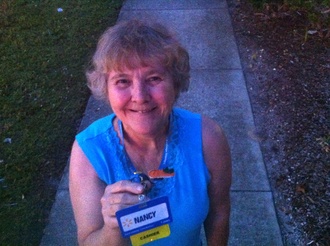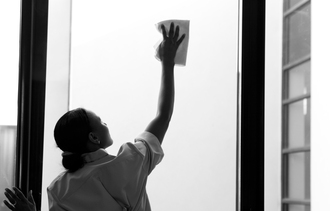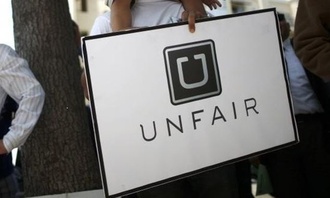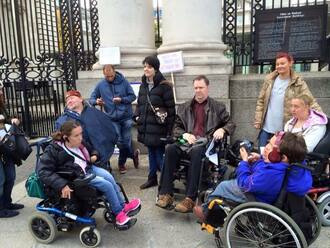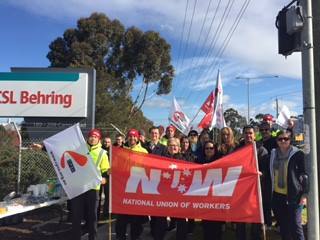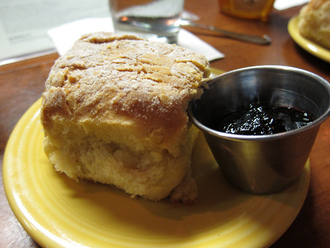-
Walmart: Extend your employee discount to cover ALL foodTo many, a 10% employee discount on ALL food may not seem like a lot. But, as Walmart associates, we know it could mean the difference between putting food on the table or going hungry. My name is Nancy Reynolds. I’m a Walmart associate from store 771 in Merritt Island, FL. For me, the food that I’m eligible for with my employee discount isn’t good for my diabetes. I need to eat healthy food multiple times throughout the day and, simply put: that is hard on Walmart pay and hours. If Walmart would extend its employee discount to cover ALL food items, like Target[1], Whole Foods, Trader Joes[2] and many other grocery stores have done, it would help associates and their families across the country. What’s more, Walmart can afford it. This is a win – win. A ten percent discount would allow Walmart associates to spend more money on food at Walmart and in return, we would also be healthier workers. I've even talked to Walmart associates in Canada who said that they receive discounts on ALL of their food, so why not here in the United States too? In the past, Walmart has listened to our calls for change, but it takes associates and community standing together to call for change. The support is there. In our survey of over 3000 Walmart workers, 99% support a ten percent discount on all food. It’s time for Walmart to listen to its associates. The time to act on this is now. Thanksgiving and Christmas are right around the corner. If we can get enough support on this petition before the holiday season, Walmart could change its policy and more associates could have the food we need to provide for our families this holiday season. [1] https://corporate.target.com/careers/benefits/financial-benefits [2] http://www.buzzfeed.com/summeranne/which-retail-chains-have-the-best-employee-discoun#.ggyzDxyR17,555 of 20,000 SignaturesCreated by Nancy Reynolds
-
Help end endless appetizers!!!It's a complete nightmare for servers, it's wearing us out, stressing us out and making our job unpleasant!1,954 of 2,000 SignaturesCreated by Stephanie Elliott
-
Tell Myer: clean up your act!My name is Susan* and I work as a cleaner at a Myer store in Melbourne. Cleaners like me work around the clock keeping Myer stores clean and hygienic. But dodgy subcontractors are underpaying us by up to $20 an hour. We are denied basic rights like sick pay, weekend rates and superannuation. If we complain we can be sacked at any time – many of us are too frightened to join our union and speak out. A few weeks ago a Myer cleaner was sacked when he asked about his rights. So was his sister – and his partner. And they weren’t even there! Myer threw out its last contractor earlier this year because cleaners were being exploited. Now it’s happening again. We should be paid properly, and be able to work without fear or intimidation. The system is unjust and is failing us. Please stand with me and my fellow cleaners and tell Myer it needs to clean up its act and demand we are directly employed and receive our full legal pay. *Not my real name.2,433 of 3,000 SignaturesCreated by Susan Myer Cleaner
-
TGI Fridays: Bring Back Auto GratServers are not able to support themselves or their families, if they don't start thinking of their employees too, families truly are going to be suffering more. There are tables who don't tip properly on parties. Many times, we have had parties of 10 or more whom did have great service -- they would even tell us -- but at the end when the bill is $250, they slip you a $10. But the government thinks hey you probably made at least 10% which would have been $25 but in all actuality you made $10.00 and still tip the bartender. So you made $5. Please help us make Fridays listen.2,287 of 3,000 SignaturesCreated by Heather Freeman
-
Starbucks: Tips for BarI feel it is important because some stores because of their location do NOT earn as much tips as other locations. Many customers are rushed away from register and forget or do not even think to leave tips, whereas workers on bar are frequently complimented on speed, style and some on latter art. Tips are vital to some of us when we've spent our check and all we need is a few bucks to buy metrocard or pay for our other necessities. $15 in tips is too little for those work too hard.43 of 100 SignaturesCreated by Amanda Villot
-
Better treatment for Uber driversUber has been treating their drivers worse and worse as time goes by. Enough is enough. Just because they label drivers as independent contractors, doesn't mean they can take advantage of them and completely ignore labor laws. Nobody is standing up for Uber drivers. Its time drivers stand up for themselves!2,072 of 3,000 SignaturesCreated by Abe Husein
-
Bubbles Salons: Give employees a 30 day notice before being firedMy name is Blanca de Leon. I started working at the Bubbles Salon located at 205 Pennsylvania Ave NW on March 9th, 2009 and worked there for 6 and a half years. I’m a stylist specializing in cuts and colors, as well as all areas relating to beauty. When I first started working at Bubbles, there were things about the company that I didn’t agree with but I stayed when I started to get to know the clients who are the best clients I’ve had in my whole career. One of the main issues was the way the management at Bubbles treated the staff, some better than others. Every time the Latino workers asked for something, they wouldn't listen to us. They even told us that we weren’t allowed to speak Spanish. There was also discrimination in who got the best appointments. Everyone except for the Latinos were given new clients, but they only gave us new clients when there were extra. But the hardest thing for me was that even though another non-Latino employee was allowed to use a mat under her styling chair, I was told that I wasn’t allowed to have one. I need the mat to help alleviate my back pain because I am on my feet all day. I told my managers about my back condition and the medication that I take to help it. I also asked them for something in writing about why I wasn’t allowed to have the mat even though another employee was, but they never gave me anything. On August 26th, I went to work and my managers called me in for a meeting. When I got there they said “We have bad news for you.” They told me that I hadn’t listened to my manager when I was told to remove the mat I used for back pain. Then they told me that I was fired. I asked if I could have 30 days so that I could look for a new job, but they refused. I wasn’t even allowed to finish the day with the rest of the clients I had scheduled. They only gave me half an hour to pick up my things and go. I filed a claim at the DC Office of Human Rights because I believe my employer discriminated against me. In six and a half years, I never had a single client complaint against me. I was a good coworker to everyone and I believe my termination was unjust. Being fired affected my life a lot. I am a single mother and I need to work to support my family. I suffered significant emotional distress after being so suddenly and unjustly fired. They must think that you don’t eat, that you don’t pay rent. Ratner Companies, which owns Bubbles Salons, owns over 1,000 salons in 16 states. I’m speaking out so that others won't have to go through what I did. Please demand that Bubbles establish a policy that requires that employees be given 30 days notice before being fired so that they can look for another job.49 of 100 SignaturesCreated by Blanca de Leon
-
Invest in Disability ServicesBecause of a lack of funding many people with disabilities are not getting the Personal Assistant support they need, making some prisoners in their own home. PAs have also suffered cuts to their pay and conditions, making ends meet a real challenge for many. People with a disability deserve to live with dignity and workers deserve a living wage. We all have the right to own independence, it's time to make this a reality for all.547 of 600 SignaturesCreated by Darragh O'Connor
-
Allow Watches & Engagement RingsWe need to quickly check the time when dating products and to keep track of breaks and punch times, and wearing a watch would be an efficient way to ensure we can always check the time without running to the BOH computer or bothering the partners on register. Engagement rings should be allowed, they are symbolic and important to those who have them, just as wedding bands are.348 of 400 SignaturesCreated by Lauren Ward
-
CSL workers demand secure jobs in the northCSL employees are skilled and hardworking. We need to stand with them to protect quality, secure jobs in the north.20 of 100 SignaturesCreated by National Union of Workers

-
Hazeldene's Workers Want Secure JobsAll workers deserve to be treated fairly. That's what we're asking for here.127 of 200 SignaturesCreated by National Union of Workers

-
Pay support staff what they deserve!Tupelo Honey Cafe is synonymous with the idea of Southern hospitality. There are always biscuits on the table and your sweet tea glass is never empty. In fact, the restaurant is so hospitable that within 5 years it’s been able to open 10 new locations across the Southeast and has announced plans to expand beyond the region and double locations over the two years. However, patrons might not know that this growth has come at a personal cost for employees. Tupelo Honey Café employees know that with growth comes change. We have absorbed our fair share of change. From eliminating free food while working to scrapping incentive based pay raises for tipped employees, it’s getting harder and harder to feel like a valued member of the team. We have also watched as our company pads its profit margins and expands the brand on the backs of the lowest paid employees and their families. Over the past couple of years, corporate management decisions have diminished the reasons we loved working for this company. Support staff (bussers/back servers) are an essential part of any well-organized and profitable restaurant. They provide support and heightened efficiency, allowing wait staff to give personal and professional service. In the summer of 2014 the company chose to maximize profits and drastically cut wages for support staff -- who used to be called bussers -- by over $3/hour. Not only does this mean that some of these support staff can no longer pay the bills or keep food on the table, but servers themselves are having a harder time making sure the customers at the table are happy too. Alia, a bartender, is a working mom and the main breadwinner of her household. Halley, a server, is a college student supporting herself while working towards her degree. When support staff is not compensated fairly, it has the ripple effect of increasing the number of servers, thereby reducing earning potential for all front of the house staff. That’s hundreds of dollars each week that could go towards paying bills and buying groceries. We are tired of complaining within our location and wishing that the company would change. This wage cut was the last straw and we knew we had to take action. That’s why we started this petition. Right now, Tupelo Honey Cafe is growing at an astounding pace and they have a choice to make: do they want to stand by their original values as a company or do they want to drive down wages of those at the bottom? According to their own website Tupelo Honey Cafe says: “We commit to paying above the industry average in every job category.” According to a 2014 interview with the owner of Tupelo Honey, Steve Frabitore stated that “none of their employees are paid minimum wage; rather, they are a Living Wage Certified business and aim for their pay to be greater than the 75th percentile of the industry average.” All we are asking is that Tupelo Honey live up to their own standards and reinstate the wages of support staff (technically called back servers) to their original levels of $5.15 per hour. Right now it is a company wide wage policy for back servers to be paid a federal minimum meant for servers ($2.13 per hour). This base wage for support staff is below local and national industry standards. If you want to "hire the best people in every position", you have to be sure those people can earn a living. Good food shouldn’t just be about the bottom line — it’s about fellowship, service and always having a seat at the table. Join us if you would like to see Tupelo Honey put its own values into action by reinstating wages for support staff.1,286 of 2,000 SignaturesCreated by Alia Todd and Hayley Ingram
Quick Links

Quick Links


